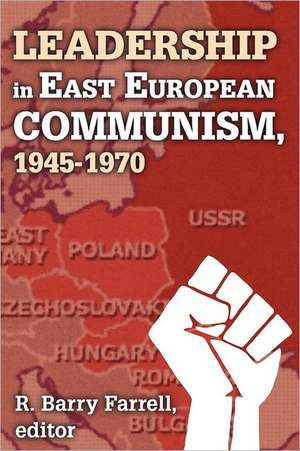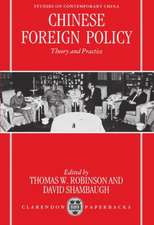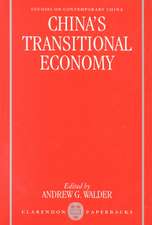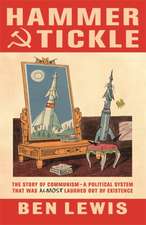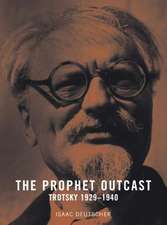Leadership in East European Communism, 1945-1970
Autor R. Barry Farrellen Limba Engleză Paperback – 15 aug 2011
| Toate formatele și edițiile | Preț | Express |
|---|---|---|
| Paperback (1) | 451.16 lei 6-8 săpt. | |
| Taylor & Francis – 15 aug 2011 | 451.16 lei 6-8 săpt. | |
| Hardback (1) | 1000.27 lei 6-8 săpt. | |
| Taylor & Francis – 6 oct 2017 | 1000.27 lei 6-8 săpt. |
Preț: 451.16 lei
Nou
Puncte Express: 677
Preț estimativ în valută:
86.34€ • 93.75$ • 72.53£
86.34€ • 93.75$ • 72.53£
Carte tipărită la comandă
Livrare economică 23 aprilie-07 mai
Preluare comenzi: 021 569.72.76
Specificații
ISBN-13: 9781412842815
ISBN-10: 1412842816
Pagini: 371
Ilustrații: 1
Dimensiuni: 152 x 229 x 20 mm
Greutate: 0.49 kg
Ediția:1
Editura: Taylor & Francis
Colecția Routledge
Locul publicării:Oxford, United Kingdom
ISBN-10: 1412842816
Pagini: 371
Ilustrații: 1
Dimensiuni: 152 x 229 x 20 mm
Greutate: 0.49 kg
Ediția:1
Editura: Taylor & Francis
Colecția Routledge
Locul publicării:Oxford, United Kingdom
Cuprins
1: Theoretical Bases of Soviet and East European Leadership; Introduction; 1: Historical Development of the Communist Theory of Leadership; 2: The Theory of Political Leadership and the Issue of Totalitarianism; 3: Marxist Theories of Leadership: A Marxist Approach; 2: Characteristics of Political Leaders and Leadership; Introduction; 4: Trends in Top Political Leadership in U S S R; 5: Top Political Leadership in Eastern Europe; 6: Representation of Career Types in the Soviet Political Leadership; 7: The Soviet Apparatchiki; 8: Career Characteristics of East European Leadership; 3: Leadership and Society; Introduction; 9: Dynamics of Change: Leadership, the Economy, Organizational Structure, and Society; 10: The Managers; 11: Modernization: New Decisional Models in Socialist Society; 12: Leadership and Group Conflict in Czechoslovakia; 13: Party and Non-Party Attitudes on Societal Change; 4: The Challenge of Change; 14: Some Reflections in Conclusion
Descriere
Fifteen eminent social scientists from North America and Eastern Europe met under the auspices of Northwestern University's Comparative Politics Program to discuss the significance and characteristics of changes in political leadership in Eastern Europe and the Soviet Union since World War II
